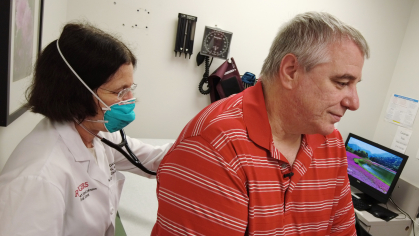
Since 2003, Iris Udasin and a team of doctors, nurses, case managers, mental health professionals and administrative staff have been treating first responders sickened by the toxic fumes at Ground Zero.
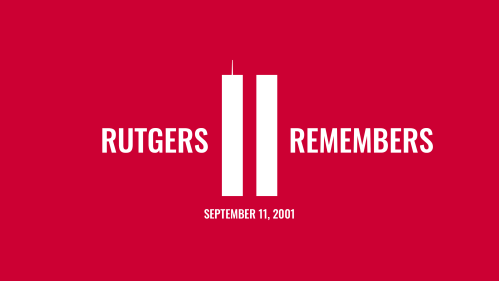

Saturday marks the 20th anniversary of the Sept. 11, 2001, terrorist attacks, a day that ushered in a period of fear, uncertainty and sadness and changed the course of the United States and the world. Faculty who study issues related to the terrorist attacks, foreign policy and national security share their reflections on how the events two decades ago transformed America and what still needs to change to bring about a better county and better world.
John J. Farmer Jr.
Director, Eagleton Institute of Politics
University Professor of Law
As the Rutgers community approaches the 20th anniversary of the terrorist attacks on 9/11/01, one demographic reality should guide our commemoration: more than 80 million Americans – virtually all of today’s undergraduates and most of our graduate students – have no memory of that day, having been born between 2000 and 2020.
Although they have undoubtedly been exposed hundreds of times to the images of the planes hitting the Twin Towers and the carnage in New York, at the Pentagon, and in the field at Shanksville, Pennsylvania, today’s rising adults did not experience the shock of that morning, when it was clear that an attempt was being made to decapitate America’s financial, military, and political leadership, and – perhaps more important – it was profoundly unclear what would come next.
Those of us involved in law enforcement and emergency response that day knew only that the vast early-warning system the United States had developed in the decades after Pearl Harbor, at a cost of trillions of dollars, had failed, leaving many of us fearful about what else might be planned, and left with little confidence that our intelligence was reliable.
That fear and uncertainty drove much of what followed, for good and for ill. The ferocity of our nation’s response degraded al Qaeda’s ability to mount other sophisticated attacks. Within months the Taliban had been unseated, its remnants pushed into the mountainous border region with Pakistan. Osama bin Laden was hunted for a decade, then killed. The paradigm of law enforcement shifted from prosecution to prevention, with notable successes in preventing another large-scale terrorist attack on our soil.
But America’s approach to the struggle against terrorism has come at a high price. Our standing in the world as a guardian of the rule of law and a beacon of democracy has suffered greatly from our misadventure in Iraq, the torture in which people engaged in the name of the war on terror, the profiling – particularly in the early days – of Muslims, the establishment of black sites for interrogation and an extrajudicial prison at Guantanamo Bay, Cuba, the widespread – some would say indiscriminate – use of drone strikes beyond the battlefield, the failure after 20 years to bring the 9/11 conspirators to justice, and the slipshod and shameful manner of our withdrawal from Afghanistan, in which we have ceded control of the country to an oppressive insurgent group which had provided a safe haven for the al Qaeda conspirators, demeaned women and crushed dissent as a matter of orthodoxy, and could never have won a free and fair election.
Most important, in the perspective of 20 years, the excessiveness of some of these tactics have prevented the United States from following perhaps the most fundamental strategic recommendation of the 9/11 Commission: “Just as we did in the Cold War, we need to defend our ideals abroad vigorously.”
Our ability to defend our ideals abroad has been compromised repeatedly by our failure to live up to them at home. That failure, in my view, has caused us to lose sight of the larger struggle of ideas that will shape the world’s future and in which, candidly, the United States has lost ground. Authoritarianism, which seemed in eclipse twenty years ago, has been gaining in popular support as a consequence of unrelenting propaganda from our adversaries, our heavy-handed approach to counterterrorism, and our nation’s growing internal divisions, which have compromised our response to the global pandemic and threatened the very survival of our form of government.
The task before our rising generations is to recover and reinvigorate those American ideals. To do so, it is important that they understand not just the ways in which we have succeeded and fallen short in our struggle against terrorism, but the existential anxiety that has driven our approach. That anxiety, however understandable, has caused us too often to exalt short-term tactics over long-term strategy.
I was born 16 years after the attack on Pearl Harbor, during the year that the Soviet Union launched Sputnik. Like today’s young adults’ attitudes toward 9/11, although I was immersed in the footage from the Pearl Harbor attack and the drumbeat of news of Soviet advances in space and global influence, I had no personal memory of Pearl Harbor or of the Sputnik launch. Perhaps because of that, I did not fully appreciate the existential anxiety that drove our responses to the Japanese attack or the so-called Red Menace: internment camps; McCarthy’s witch hunts; the Vietnam war.
This is the lesson I think our rising generations can take from the past 20 years: not to allow fear to lead to the adoption of tactics that compromise America’s long-term strategic interest in a world that respects the rule of law and the promotion of self-determination among its people.
John J. Farmer Jr. was serving as the New Jersey Attorney General on 9/11 and later served as Senior Counsel to the 9/11 Commission
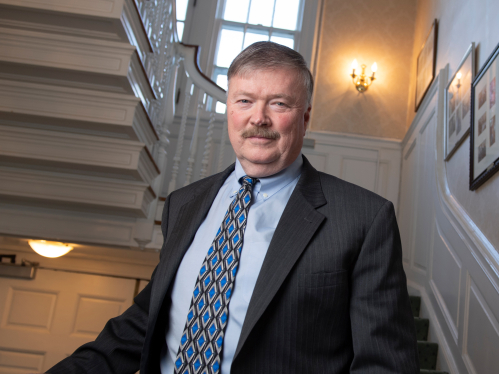
Deepa Kumar
Professor of Journalism and Media Studies
Rutgers-New Brunswick
On Sept. 11, 2001, I was filled with a sense of horror as I watched the Twin Towers crashing down. I was saddened over the deaths that occurred that day and worried about whether friends or relatives were in the towers. Those who died that day include a multi-racial assemblage of people from the U.S. as well as around the world. Even as I was processing the attack, I started to feel a sense of dread over what was to come: what would the United States do in response?
When I went to school, one of the first people I encountered was a colleague who jeered, “Are you happy?” Momentarily stunned, I could only stutter that I was not, and that I had just learned that some people I know might have been in the Twin Towers. I wondered if he asked me this question because of my politics and criticism of U.S. foreign policy or because I am a brown-skinned person.
Later that day, I stopped by the grocery store, where the checkout clerk could barely conceal his contempt toward me. Eventually he flat-out asked me to apologize for what had happened. Again, I was taken aback. I didn’t know how to reply. As a normally outspoken teacher, scholar and activist, I wasn’t used to this sense of muteness. When I regained my composure, I asked him if he had heard of Timothy McVeigh and Christian fundamentalists who had similarly murdered numerous people. I asked him if he thought that all Christians were responsible for these acts. He didn’t reply.
What struck me after this experience is that what was at work was the phenomenon that the French-Tunisian writer Albert Memmi has called the “mark of the plural.” This racist logic denies individuality to those seen as part of a colonized collective. All Muslims and those who “look Muslim” were produced as a “race” of people who were collectively to blame for the actions of the few. Since then, Muslims have had to apologize not once but repeatedly for every attack perpetrated by Muslims on Western targets. White people are not asked to account for the violence of people like Michael Wade Page, Dylan Roof, or other neo-Nazis and white supremacists.
My fear of what was to come was realized in the last 20 years. The Costs of War project at Brown University estimated that, as of 2020, more than 800,000 people had been killed as the result of direct war violence in five Muslim-majority countries where the United States conducted military operations. Between 37 and 59 million people were displaced as a result of interventions in eight countries. The full-scale dehumanization of Muslims, which builds on earlier colonial legacies, has justified this human cost.
The 20th anniversary of 9/11 should cause us to reflect in the same way that the murder of George Floyd in 2020 precipitated a discussion of the human cost of the criminal justice system. The Movement for Black Lives shed light on how anti-Black racism is not simply about hate speech and individual prejudice, but is rooted in the structures of U.S. society. Similarly, anti-Muslim racism is not simply religious intolerance or misunderstanding, but a structural form of racism. It is this racism that we must understand, address, and seek to end.
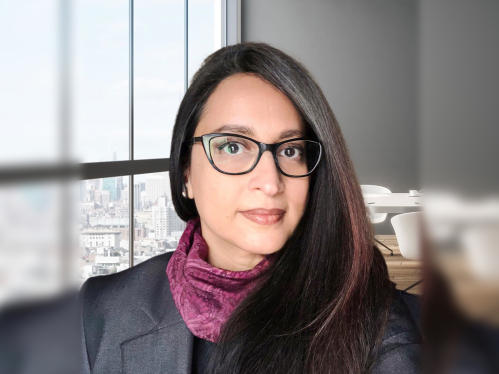
Steven Miller
Professor of Professional Practice and Director of Undergraduate Studies, Journalism and Media Studies
Rutgers-New Brunswick
On September 11, 2001, I was teaching Introduction to Media Systems Process (now Introduction to Media) at Lucy Stone Hall on the Livingston Campus. A little more than halfway through the class, a student burst through the glass doors just outside the auditorium and ran in screaming, “The world is over! We’re at war! The towers just came down!” The 350 students in my class let out a collective gasp and started to rush towards the exit. I bellowed, “Sit down!” For some reason, and as if on autopilot, they listened and returned to the same, exact seats. Once they were settled, I asked them to leave based on the campus to which they had to travel.
During my 10-minute drive back to College Avenue, a New York-based news radio station was reporting that there was a bomb outside the White House and everyone had to be evacuated, and the Armed Forces were mobilizing throughout the world, ready to march on other countries. Only the latter was partially true.
In the days, weeks, months, and years since that day news outlets have taken molehills of 9/11 information and turned them into mountainous conspiracy theories or sensational headlines. They have altered the tenor of their newscasts and reports and helped change this once-confident country into a scared society filled with paranoia, making our citizens believe there was evil lurking on every street corner, preying on our communities. The media latched onto a narrative that has served to tear the seams away from our nation’s fabric and contributed mightily to the polarization that now envelopes us. This can be readily seen in our politics, relationships, and the many negative responses to the Covid epidemic.
This slow, but steady diminishing of the fourth estate can be traced to many things and one of them is its 9/11 coverage. Instead of sticking to tried and true journalistic principles, such as being unbiased, using facts, and tracking down the truth, the horrific events of that autumn day jumpstarted the industry’s use of rumor, innuendo, sensationalism, and the dreaded “according to a source.” While it is true that the growth of digital media has contributed, traditional news outlets did not help their own cause. Readers and viewers can’t and won’t depend on alleged and supposed information or entities more interested in lining their pockets or serving their own interests than apprising citizens about what is truly going on.
The media have taken a hit because of it. According to Gallup, in 1997, four years prior to the attacks, 53 percent of all those polled stated they had a great deal or a fair amount of trust in the news media. By 2019, that number was down to 41 percent. A recent report by the Reuters Institute for the Study of Journalism at Oxford found that the United States ranked last in media trust of the 46 countries examined, including some with authoritarian regimes.
The Freedom Tower now stands in the spot where the Twin Towers once stood. It rose from the ashes and rubble of its predecessor and has come to symbolize resilience and determination in a time of great distress.
The news media need to rebuild, too. It is time for a self-examination, rebirth, and return to a more trusted way of informing the public so that it can once again be democracy’s trusted fourth pillar holding up and accurately reporting on the American experiment.
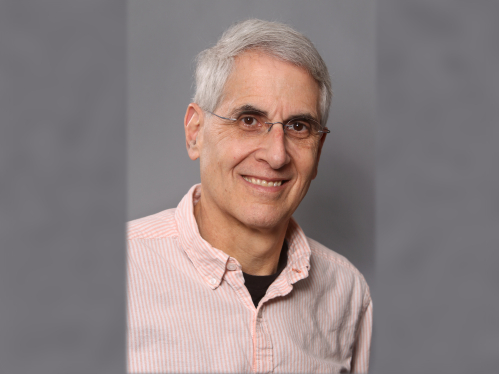



The 20th anniversary of 9/11 should cause us to reflect in the same way that the murder of George Floyd in 2020 precipitated a discussion of the human cost of the criminal justice system ... anti-Muslim racism is not simply religious intolerance or misunderstanding, but a structural form of racism.
Deepa Kumar
Sahar Aziz
Professor of Law
Director of the Center for Security, Race and Rights, Rutgers Law School
Ignorance of our history dooms us to repeat past mistakes. While the speed at which the Patriot Act was passed through Congress (a mere 45 days) was unprecedented, granting the FBI expansive enforcement authority was not. The post-9/11 era regressed our nation back at least four decades to a time when massive surveillance of African Americans and political dissidents was not only pervasive, but acceptable. J. Edgar Hoover’s infamous COINTELPRO program granted FBI agents unfettered discretion to spy on and infiltrate groups he deemed a security threat. In the 1960s and 1970s, the targets were African American civil rights leaders, the Nation of Islam, and anti-Vietnam activists. In the aftermath of 9/11, it was Muslims. But this time the underlying legal authorities went beyond a single program.
Expanded criminal laws merged with immigration laws to sustain a hostile political environment for Muslims with grave ramifications to their civil liberties. As I explain in The Racial Muslim: When Racism Quashes Religious Freedom, material support to terrorism laws (passed under the Clinton administration) were aggressively enforced against Arab and South Asian Muslims to incarcerate, deport, and more importantly – chill criticism of U.S. policy within Muslim communities. The Absconder Apprehension Initiative, started in January 2002 targeted thousands of Arabs and South Asians for deportation. The National Security Entry-Exit Registration System (NSEERS) required hundreds of thousands of nonimmigrant Muslim men to register with the government for over a decade. And the FBI intimidated tens of thousands of Muslims with so-called voluntary interviews at their homes and workplaces each time a terrorist attack occurred in a Western nation. The message was clear: Muslims are presumptively suspect.
For these rights-infringing programs to be successful, the government needed intelligence about the three to five million Muslims in the United States. This is where the Patriot Act’s expanded surveillance and investigative authority enabled government overreach. Law enforcement could more easily access an individual’s records held by third parties such as banks, internet service providers, and online businesses. The government had the authority to obtain secret search warrants wherein a person’s property was searched without their knowledge, in contrast to a traditional search warrant. The basis on which the FBI could obtain a Foreign Intelligence Surveillance Act (FISA) warrant was lowered to merely relevant to national security. And Fourth Amendment exceptions to government collection of private communications’ metadata without a warrant was expanded.
Meanwhile, the Department of Justice relaxed its investigative guidelines to allow agents to conduct threat assessments without having to show a predicate act of illegal activity. Countless threat assessments on Muslims were initiated under the pretext of national security. This led to predatory full investigations authorizing informants and undercover agents to be unleashed into Muslim communities, mosques, businesses, and social media on fishing expeditions. Religious Muslims who criticized the U.S. occupation in Iraq, the War on Terror, or other American policies attracted the most attention of the spies tasked with initiating sting operations.
To be sure, systemic rights violations of minority communities is not a uniquely post-9/11 phenomenon. Whether it is our nation’s original sins of African enslavement and near extermination of Native Americans or targeting Black dissidents and anti-war activists in the 20th century, the underlying causes traverse time. Only when we learn our history through the experiences of the subordinated can we finally dismantle the laws and policies that collectively punish minorities our government decides are the next scapegoat.
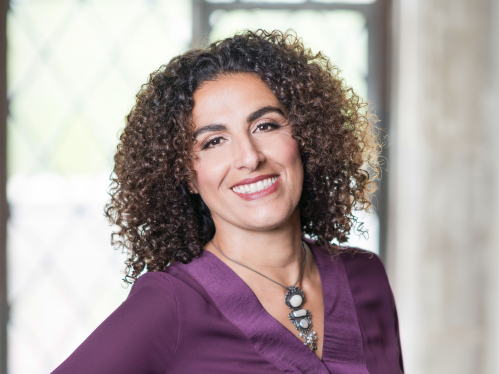
Wojtek M. Wolfe
Associate Professor, Department of Political Science
Rutgers-Camden
With the upcoming 20th anniversary of the 9/11 attacks, we are witnessing a shift in the international power balance, with the US becoming more selective in how it engages in global issues. The recent, difficult, and complicated withdrawal of US military forces from Afghanistan amid a worsening situation is indicative of how America’s role in the world has been changing. In the last decade, we began shedding our large military footprint in Iraq and Afghanistan and backed down in Syria. We accepted the consequences of ISIS in Iraq, Assad and chemical weapons in Syria, and the buildup of Russian ground and airpower in the region. And, we are now accepting the predictable consequences of Afghanistan falling back into regional and tribal factions.
At this point in time, we are facing the very real threat of changes to the status quo in various regions and we are not able to effectively deal with all of them at the same time. Currently, Russian tanks are lining up at the Tajikistan border while Pakistani forces are expected to bolster the Taliban as it tries to gain control of the country while fighting ISIS-K. Tensions in the Middle East are at all-time highs among top oil producers and Covid has damaged their economies, limiting their usually robust abilities to bounce back. Putin is calculating how to split forces between Syria and the Afghanistan region, complicating his recent plans for the rest of Ukraine. The power vacuum left behind by the US will now force other countries to redistribute their resources while funding conflicts in a post-Covid global economy. This is not a promising situation, but the US is not interested in dictating those battles.
Although these circumstances seem grim, the US is making strategic choices about how and when, and if, we will become involved. Decisions will most likely be made based on different priorities than two decades ago, with economics and energy security as important drivers. For example, it is likely East Asia will continue to receive the bulk of US attention because it is the epicenter of economic activity and security strategy as well as the biggest purchaser of Middle Eastern oil. As a result, we will see that these shifts in global realities will provide critical pivot points for the US to continue to recalculate its foreign policy and anticipate an increasingly unstable world.
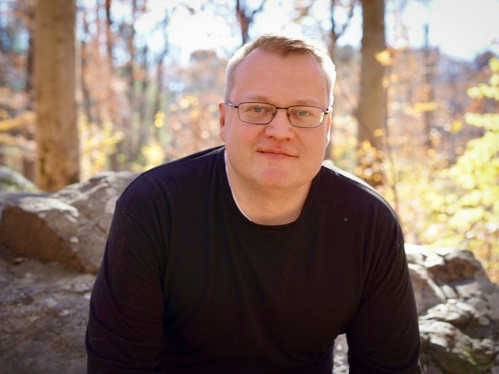
Ava Majlesi
Director of Rutgers’ Center for Critical Intelligence Studies
Associate Director of the Miller Center for Community Protection and Resilience
I will never forget where I was on 9/11. I was an undergraduate at Rutgers living in the Easton Avenue apartments and was abruptly awoken by my roommate’s screams after news broke that a plane had crashed into the North Tower. Later that night, some friends gathered in an attempt to process what had happened that morning – to process our collective grief. To my shock, a friend declared that the United States should “nuke the entire middle east.” For the first time in my life, I felt like an outsider in my own country. As the child of Iranian immigrants turned U.S. citizens – and the first American-born person in my family – I still feel the sting of that comment 20 years later.
My parents left Iran before the 1979 Revolution and planted roots in New Jersey when their parents warned them that the situation there was unlikely to improve. Stay, they said, and build a more promising future in America. My parents wanted their children to assimilate into American society. In addition to celebrating Persian holidays and traditions, we celebrated traditions associated with Christmas. We had Iranian family friends, but I was encouraged to befriend kids of all backgrounds. I joined the town’s sports teams and school clubs. I toggled between two cultures – which at times were at odds with one another. But while assimilation has negative connotations in some circles, my parents didn’t see it as an “all or nothing” proposition. In their minds, I could be accepted as American without sacrificing my Iranian roots. My parents hoped I could avoid the pain and bigotry they faced as Iranians in the United States – caught in the continuous backdrop of a fraught relationship between the two nations.
Who can blame my parents in their quest for assimilation, especially when people perceived to be Muslim – the majority of whom are peaceful, productive and successful contributors to society – were vilified for the actions of an extremist terror group? Let’s face it. You know you’re in trouble when the President of the United States asserts that the country of your birth is part of the “Axis of Evil” and a U.S. Senator says his biggest concern is finding out he has Iranian DNA.
Tensions between the United States and Iran since 1979 have led Iranian-Americans to blend in – as if trying to avoid detection. The terror attacks on 9/11 and subsequent backlash against Arabs and Muslims only strengthened the desire to separate one’s private, Iranian self from one’s public, American self. The problem, in my opinion, is that Iranian-American assimilation seems to have been too effective, so much so that we don’t have an accurate estimate as to how many people with Iranian heritage live in the United States. And while Iranian-Americans have been successful in becoming doctors, lawyers, engineers, and entrepreneurs, they aren’t running for public office in significant numbers, leaving a representation void and lack of a collective voice for those with a shared cultural identity.
The bottom line is that assimilation is fine at the individual level; it is a survival mechanism that has allowed individuals to prosper in America. But that same survival mechanism has been detrimental to the collective good of the Iranian-American community. It’s only taken me the 20 years since 9/11 to realize it.
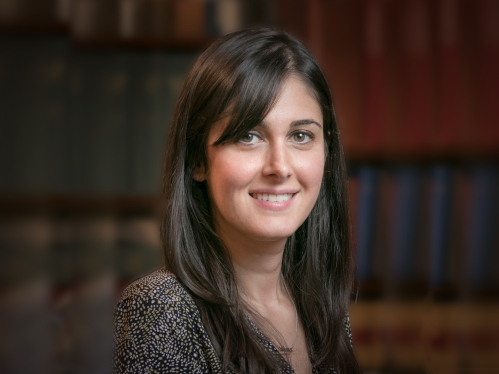



As my daughter observed after 9/11, I too believe there are more good people in the world than bad people. I also believe that the good people need to find each other and work together, despite all their differences, if we are to build a better country and a better world in the next 20 years.
Robert W. Snyder
Sylvia Chan-Malik
Associate Professor,
American Studies and Women’s, Gender, & Sexuality Studies
Rutgers-New Brunswick
For an entire generation of U.S. Muslims born and raised in the United States from the mid-1990s through the early 2000s – i.e. “Gen Z” Muslims – there has never been a world without the War on Terror. As launched under President George W. Bush following the 9/11 attacks, the War on Terror has come to exist as a sprawling, global infrastructure of surveillance, detention, and carceral power that is both physical and ideological, producing common sense logics that link Islam and Muslims to terrorism across spaces of U.S. culture, politics, and media.
This infrastructure is part and parcel of Gen Z Muslim American life.
Since 9/11, I have witnessed its machinery: stories of middle-of the-night raids on U.S. Muslim citizens, friends and colleagues who find their names on no-fly lists, and Muslim youth who tell me of surveillance on their mosques, community centers, and even their homes. For some, in particular, Black American Muslims, this type of profiling is nothing new, as their communities have long been subjects of state surveillance and attack. For other first or second generation U.S Muslims, such treatment has shattered their illusions of America as a space of safety and possibility, of justice and “freedom.”
As a scholar of race and religion, specifically, of the history of Islam and Muslims in the United States, I think often about the effects of the War on Terror on my students. I have certainly seen Trauma with a capital “T” – young people suffering from PTSD, anxiety, and depression from their own direct experiences of detention and surveillance, of being the target of hate crimes, or as the result of the constant epithets and insults directed at their faith and culture.
But far more often, I see the little “T” traumas – those small, seemingly-mundane, everyday experiences of U.S. Muslims that have been shaped by the infrastructures of terror. Like feeling ashamed of being Muslim, or hiding it from others. Discomfort when entering a room, unsure of the intentions behind other’s stares. A nagging sensation that they might be attacked. Deciding not to pray, or becoming more “secular” to fit in. Taking off the headscarf to feel more safe. Or putting on the headscarf to feel more Muslim. Assimilating. Feeling alienated from God. Feeling angry at God. Self-hatred. Embarrassment. Fear.
Writer Toni Morrison once said, “The function, the very serious function of racism is distraction. It keeps you from doing your work. It keeps you explaining, over and over again, your reason for being.” This is what concerns me most about these small ‘t’ traumas, the ways in which an entire generation of U.S. Muslims has felt they needed to constantly explain and justify who they are.
Thankfully, most young Muslims I know are rejecting this. Many have taken it upon themselves to educate themselves about their religion, and to delve into the long history of Islam’s legacy and presence in the United States, which spans 400 years. I will always recall a Muslim student in my Islam in/and America class a few years ago, who after reading The Autobiography of Malcolm X, proclaimed his wonder at the incredible range of Malcolm’s visions on Black liberation, Islam, and human rights. “We should be having those visions too,” he told me, “except we’re always so busy defending ourselves against what other people think of Islam.”
Twenty years after 9/11, we now have a new generation of US Muslims that has grown up with – and is realizing they have outgrown – the infrastructure and logics of the War on Terror. As far as I can tell, they’ve recognized its distractions, and are endeavoring to build new identities and visions on their own terms.
A longer version of this essay appears on TRT World.
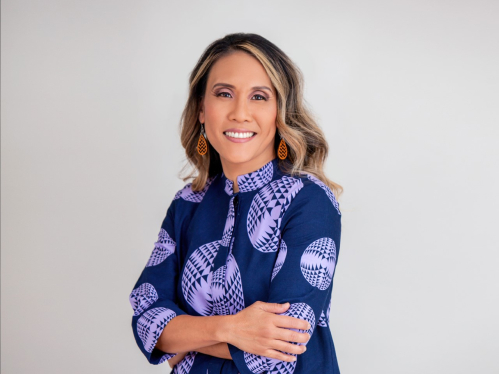
Robert W. Snyder
Professor Emeritus of Journalism and American Studies
Rutgers-Newark
Dear Students,
Many of you were born before or just after the terrorist attacks of September 11, 2001, so understandably you have no strong memories of that terrible day. As one who was there and witnessed the attacks in lower Manhattan, here is what you need to know: it was hell, but ordinary people stepped up and helped each other survive.
I was in the middle of my commute to Rutgers-Newark, standing across Broadway from the south tower of the World Trade Center, when it collapsed in fire and smoke. I ran for my life, got beyond the falling debris, and, as the smoke cleared, locked arms with two other men and headed east. As we made our way down a narrow side street, food court workers threw open a door and pulled us inside.
The workers, mostly women from all parts of the world, gave us water to clear our throats and towels to filter out the dust when we breathed. One woman loaned me her phone – cell phones were rare in those days – so I could call my wife and tell her I was alive. (Until I did, my wife told me months later, she assumed that I was dead.) Then I made my way out into the streets of lower Manhattan, gave containers of water to passing strangers, and walked home to my family’s apartment on East 81 Street in Manhattan.
In family discussions over our dinner table, we made much of a quote from an op-ed in the New York Times by the scientist Stephen Jay Gould: “Good and kind people outnumber all others by thousands to one. The tragedy of human history lies in the enormous potential for destruction in rare acts of evil people, not in the high frequency of evil people. Complex systems can only be built step by step, whereas destruction requires but an instant.”
My daughter Allison brought that back to her first-grade class at PS 290 in a nice paraphrase: “there are more good people in the world than bad people.” Her teacher, Paula Rogovin, inscribed that on a sheet of paper and kept it posted for many years.
As I said when I returned to Rutgers, the women who helped me didn’t ask me about my nationality, my religion, or anything else. They simply recognized me as a suffering human being and helped me. Our response to 9/11, I said in a campus forum, had to be built on that kind of solidarity if it was to succeed.
As young people who grew up in the shadow of 9/11, you know what followed as well as I do. In following the news from Afghanistan, Iraq, and Guantanamo, to name only a few places made famous in efforts to prevent another 9/11, many of my students acquired layers of fear, doubt and pessimism that make it hard to imagine a better world. Living through the COVID pandemic, you have seen how a lack of solidarity can take lives. How all of these things happened is inextricably bound up with the events set off by 9/11, and they are worthy of questioning and study for years to come.
So the next time the anniversary of 9/11 comes around, and for the rest of your lives, remember two things: the need for courage and generosity in a time of crisis, and the need to ask questions on the morning after.
As my daughter observed after 9/11, I too believe there are more good people in the world than bad people. I also believe that the good people need to find each other and work together, despite all their differences if we are to build a better country and a better world in the next 20 years.
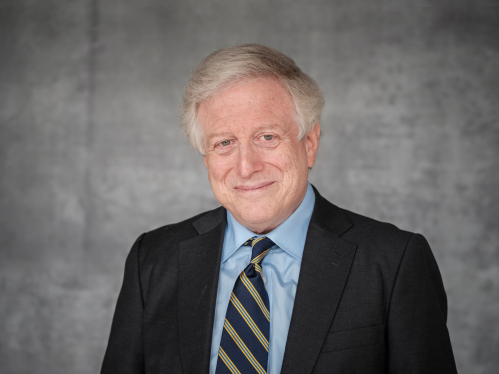
Angus Kress Gillespie
Professor of American Studies
Rutgers-New Brunswick
Like everyone else of my generation, I remember Sept. 11 clearly and vividly. That morning, I was at home in New Brunswick, calmly reading the newspaper and sipping coffee. Suddenly, I got a call from my older son, who had been listening to the radio. He said, “Dad, a small plane has just crashed into the World Trade Center. You’d best turn on the television to see what’s going on.” I figured it must have been an accident, but I wondered how such an accident could happen on a clear day. A few minutes later, I saw the second plane crash into the South Tower in real time.
Now I knew that this was no accident. It was a terrorist attack, but I was not worried. I figured that firefighters would arrive and put out the fire. Later, the Port Authority would repair the damage, and life would go on. Of course, I was wrong. A few minutes later, both towers collapsed. Soon, the phone started ringing off the hook. There were numerous calls from newspaper reporters across the country. Clearly, they had done their research, and they knew that I had written a book, Twin Towers: The Life of New York City’s World Trade Center. All week long, I fielded calls from The New York Times, the San Francisco Chronicle, the Dallas Morning News, and many others. I felt pleased and proud that I was able to provide a good deal of honest and accurate information to all these reporters.
By Sunday, the calls stopped. The reporters had moved on, and I was left alone with my feelings of sadness and confusion. My pride began to give way to humility, as I realized that I had no idea why these attacks had taken place. By reading and listening to the news, I learned that attacks had something to do with the anger of Muslims in the Middle East. Here was a topic that I knew nothing about. I had a lot to learn. Why do they hate us? What had we done to provoke them?
I knew that I had to read up on the topic. By the fall of 2002, I launched a course at Rutgers about “The Global War on Terror,” and I have continued to teach that course right up until the present. I covered the invasion of Afghanistan and later the invasion of Iraq. With my students, I read books on the politics of the Middle East as well as memoirs of wartime veterans and reporters. We asked difficult questions. Is torture ever justified? Are drone strikes ethical? How can we ever know that we have won the war? My biggest takeaway from the anniversary of September 11th is that somehow we all adjusted to the idea of forever wars.
When I walk into a classroom to teach a course on the 20th anniversary of September 11th this fall, I know that I will face a challenge. For people of my age, we remember the event with all of its emotional impact. However, most of my students were born after those attacks took place. They only know about the attacks as a historical event. My challenge will be to convey to them the shock and horror of that event – the attacking planes, the terrible explosions, and the crashing buildings. How do I adequately describe my own feelings, my own emotions, and my own reactions? It will take all my powers of communication to capture those feelings of surprise, anger, and confusion.
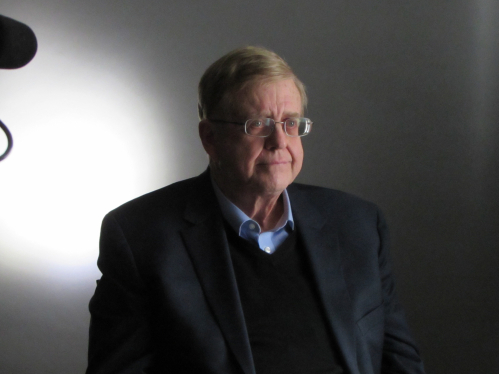




Since 2003, Iris Udasin and a team of doctors, nurses, case managers, mental health professionals and administrative staff have been treating first responders sickened by the toxic fumes at Ground Zero.